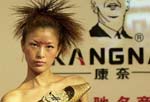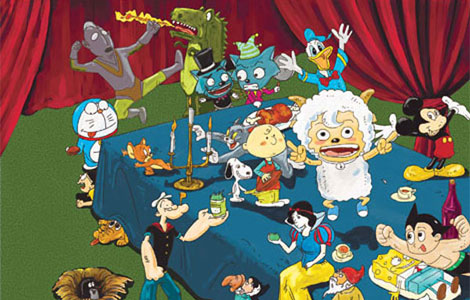People
The game plan
Updated: 2011-03-29 07:54
By Lin Qi (China Daily)
As a child, Zheng Yaqi was the envy of other children. His father Zheng Yuanjie, dubbed "king of fairy tales", is a best-selling writer of children's literature whose works have touched the hearts of millions of children and adults.
|
 Zheng Yaqi (left) has been promoting his father Zheng Yuanjie's (right) works since 2004. Provided to China Daily |
Although Zheng Yaqi didn't enjoy school, he says his experiences were a source of inspiration for his father.
After leaving primary school, he was home-schooled by tutors and his father.
When he turned 18, as agreed with his father, Zheng moved out of his parents' home, to make his own life.
His first job was as a supermarket help, earning him 0.5 yuan (8 US cents) for every basket of eggs he helped carry.
While Zheng was keen to avoid being known as Zheng Yuanjie's son in his teenage years, at 28 he is in the business of expanding his father's legacy.
In 2010, he founded Beijing Pipi Lu Culture and Technology Company, named after a beloved character in his father's fairy tales. He is committed to exploring the commercial potential of his father's works.
Tucked away in a fancy residential community on Beijing's outskirts, Zheng Yaqi's company is a three-storied villa that looks like a cottage from one of his father's stories. On the door to his office hangs a plate, which, instead of saying chief executive officer (his business title), calls him "Captain of the Cruiser Qiqi".
Cruiser Qiqi is a fairy tale that Zheng Yuanjie wrote in the late 1980s and was adapted into an animated film.
Most employees at Pipi Lu company grew up reading Zheng Yuanjie's stories and saw the fictional characters as their childhood buddies. Today, they express an enduring love for Zheng's literature by visualizing his stories in a vivid, three-dimensional way.
Feb 10 marked the day that Pipi Lu, the 12-year-old creative and warm-hearted boy, first appeared in Zheng Yuanjie's works three decades ago. At a ceremony in Beijing on Feb 10, 2011, Zheng Yaqi launched an online 3D game, Pipi Lu and 419 Sins.
The game creates a dreamland called "Planet Z". The player's task is to prevent the bad guys from committing crimes and to punish those who have violated the law, alongside the characters in Zheng's fairy tales.
"The game has so far attracted tens of thousands of registered players. About 30 percent are children aged between 8 and 12, while the others are adults in their 20s and 30s. Many are young parents who want to introduce their children to Zheng Yuanjie's literary magic," his son says.
He says the game originated from the eponymous family textbook, Pipi Lu and 419 Sins, a series of 10 textbooks compiled by Zheng Yuanjie for his son's home schooling.
"In 1995, he (Zheng Yuanjie) was invited to give a speech at a juvenile detention facility. When he asked a 12-year-old boy why he was there, the youngster said he had stolen 500 yuan. He asked him, 'Haven't your parents told you it's illegal to steal?' The boy in turn shot back, 'Have you told your child about that'?" Zheng Yaqi says.
"He (Zheng Yuanjie) realized how little he had done to keep me from being jailed. So he bought a Criminal Law of the People's Republic of China - then 419 articles in total - and developed each article into a fairy tale for me to read," he says.
 |
The book rolled off the press of the 21st Century Publishing House in 2006. But it was not until an experience when flying that he decided to convert the book into the first game product of his company.
"There was this 10-year-old girl who was traveling alone. A guy in the seat beside her asked her to go with him after the plane landed. He meant it jokingly, but the girl took it seriously and took out a Pipi Lu and 419 Sins, saying, 'This book will tell you how many years in jail one can get for child abduction'," he says.
"For today's children, it's as important to learn how to protect as to be law-abiding.
"Some parents ask why the game has crimes that are not relevant to children's lives, for instance, intellectual property rights infringement. We believe a child should know that piracy is a kind of stealing, and buying counterfeits is also wrong," he says.
Zheng used to keep a distance from his celebrated father, always addressing him by name, but over the past seven years, he has become his father's business partner.
"Zheng Yuanjie seldom did any publicity for his books. He believed in the old adage that good wine sells well even while hidden deep in the alley. He's earned enough fame and money. But I think the wealth of his fairy tales hasn't been fully tapped," he says.
The younger Zheng has always had a strong business sense. A self-taught computer expert, he made money by contributing stories to computer newspapers and magazines. He worked with college students to design home pages for companies. He also invested the money he borrowed from his father to make small profits.
In 2004, he quit his job at a newspaper. He was then the director of its technology department. His new career was to breathe new life into his father's fairy tales. He pumped in all his savings to open the Pipi Lu Bookstore. A year later he founded the magazine Pipi Lu with his father as its only contracted writer. He cooperated with book publishers and edited the Pipi Lu series, which included his father's 70 fairy tales. The series has sold about 20 million copies in the past four years.
He encourages his low-profile father to play a bigger role in public life. He launched the "Pipi Lu Lecture Room" in 2007 and pays his father to give children weekly lessons on creative writing. He also arranged for the writer to guest host many popular TV programs focused on public speaking.
He persuaded Zheng Yuanjie to post blogs and microblogs, to better communicate with his children and parent readers. He also asked him, reportedly one of China's wealthiest writers, to donate money to child victims of the earthquake in Sichuan and Qinghai provinces.
"I'm his boss. I still call him by his name. And we always share expenses," Zheng Yaqi says.
His next project is Bao'er's Adventures, an animated series, which talks about Pipi Lu and his giant panda friend Bao'er. The series will be aired on TV this summer.
"I'm more mature now to live as a 'xing er dai (a celebrity's child)'. People can't decide what parents they were born to, but they can make great efforts to become who they want to be," he says.
Specials

Fill dad's shoes
Daughter and son are beginning to take over the family business of making shoes.

Have you any wool?
The new stars of Chinese animation are edging out old childhood icons like Mickey Mouse and Hello Kitty.

Virtual memorial
High-Tech touches to traditional tombsweeping festival help environment